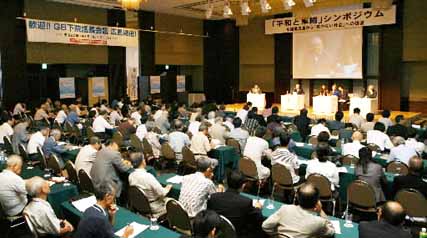“Peace and Disarmament” symposium held in Hiroshima ahead of the G8 Speakers’ Summit
Sep. 1, 2008
by Keisuke Yoshihara, Staff Writer
“Peace and Disarmament Symposium: Proposal for a ‘Nuclear Free Society’ from the A-Bombed City of Hiroshima” was held at a hotel in downtown Hiroshima on August 31. In advance of the G8 Summit of Lower House Speakers set for September 2, the panelists shared their views on such issues as the leadership of lawmakers who represent the public and the significance of holding a meeting in Hiroshima at which the top legislators from the nuclear powers will take part.
The symposium was jointly organized by the Japanese Parliamentarian Association for the Promotion of International Disarmament, led by Yohei Kono, speaker of the House of Representatives, and by the Executive Committee for the symposium, chaired by Shizuteru Usui. Tsutomu Ishiguri, professor at Kyoto University of Foreign Studies, served as the moderator. The three panelists for the event included Sunao Tsuboi, chairman of the Hiroshima Prefectural Confederation of A-bomb Sufferers Organization, Steven Leeper, chairman of the Hiroshima Peace Culture Foundation, and Nassrine Azimi, director of the Hiroshima Office of the United Nations Institute for Training and Research (UNITAR). Approximately 250 people listened attentively to their statements.
To realize a “Nuclear Free Society,” Mr. Leeper stressed that, in the time leading up to the Nuclear Non-Proliferation Treaty (NPT) Review Conference in 2010, “We are at a decisive crossroads in terms of choosing whether we will face the use of nuclear weapons or abolish them.” He explained the importance of the 2020 Vision Campaign, in which Mayors for Peace is aiming for the abolition of nuclear weapons by 2020, and the Hiroshima-Nagasaki Protocol, which provides a roadmap for this vision.
Ms. Azimi argued that the arms industry itself must be eliminated and that it is imperative to destroy the myth that possessing nuclear weapons equates with power. She also urged parliamentarians to “take strong action for peace” in serving as representatives of the public.
Concerning the role of Hiroshima as an A-bombed city, Mr. Tsuboi recounted his experience of the atomic bombing and his subsequent struggle with illnesses wrought by the bomb. “We should transmit the damage done by nuclear weapons through all sorts of means,” he appealed to the gathering. “In this regard, the accounts of the A-bomb survivors are highly significant.”
Professor Ishiguri, former director of the U.N. Regional Center for Peace and Disarmament in Asia and the Pacific, proposed that “Nuclear disarmament will mean driving the nuclear powers into a corner. I hope that a conference similar to the U.N. Special Session on Disarmament can be held at the non-governmental level, and stronger efforts will be made to urge the leaders of the United States and Russia to understand the experience of Hiroshima.”
The panelists all pointed out that the G8 speakers’ visit to Hiroshima and Peace Memorial Museum has great significance. The summary of the symposium will be delivered to Speaker Kono, who serves as the host for the G8 Speakers’ Summit.
(Originally published on September 1, 2008)
“Peace and Disarmament Symposium: Proposal for a ‘Nuclear Free Society’ from the A-Bombed City of Hiroshima” was held at a hotel in downtown Hiroshima on August 31. In advance of the G8 Summit of Lower House Speakers set for September 2, the panelists shared their views on such issues as the leadership of lawmakers who represent the public and the significance of holding a meeting in Hiroshima at which the top legislators from the nuclear powers will take part.
The symposium was jointly organized by the Japanese Parliamentarian Association for the Promotion of International Disarmament, led by Yohei Kono, speaker of the House of Representatives, and by the Executive Committee for the symposium, chaired by Shizuteru Usui. Tsutomu Ishiguri, professor at Kyoto University of Foreign Studies, served as the moderator. The three panelists for the event included Sunao Tsuboi, chairman of the Hiroshima Prefectural Confederation of A-bomb Sufferers Organization, Steven Leeper, chairman of the Hiroshima Peace Culture Foundation, and Nassrine Azimi, director of the Hiroshima Office of the United Nations Institute for Training and Research (UNITAR). Approximately 250 people listened attentively to their statements.
To realize a “Nuclear Free Society,” Mr. Leeper stressed that, in the time leading up to the Nuclear Non-Proliferation Treaty (NPT) Review Conference in 2010, “We are at a decisive crossroads in terms of choosing whether we will face the use of nuclear weapons or abolish them.” He explained the importance of the 2020 Vision Campaign, in which Mayors for Peace is aiming for the abolition of nuclear weapons by 2020, and the Hiroshima-Nagasaki Protocol, which provides a roadmap for this vision.
Ms. Azimi argued that the arms industry itself must be eliminated and that it is imperative to destroy the myth that possessing nuclear weapons equates with power. She also urged parliamentarians to “take strong action for peace” in serving as representatives of the public.
Concerning the role of Hiroshima as an A-bombed city, Mr. Tsuboi recounted his experience of the atomic bombing and his subsequent struggle with illnesses wrought by the bomb. “We should transmit the damage done by nuclear weapons through all sorts of means,” he appealed to the gathering. “In this regard, the accounts of the A-bomb survivors are highly significant.”
Professor Ishiguri, former director of the U.N. Regional Center for Peace and Disarmament in Asia and the Pacific, proposed that “Nuclear disarmament will mean driving the nuclear powers into a corner. I hope that a conference similar to the U.N. Special Session on Disarmament can be held at the non-governmental level, and stronger efforts will be made to urge the leaders of the United States and Russia to understand the experience of Hiroshima.”
The panelists all pointed out that the G8 speakers’ visit to Hiroshima and Peace Memorial Museum has great significance. The summary of the symposium will be delivered to Speaker Kono, who serves as the host for the G8 Speakers’ Summit.
(Originally published on September 1, 2008)








